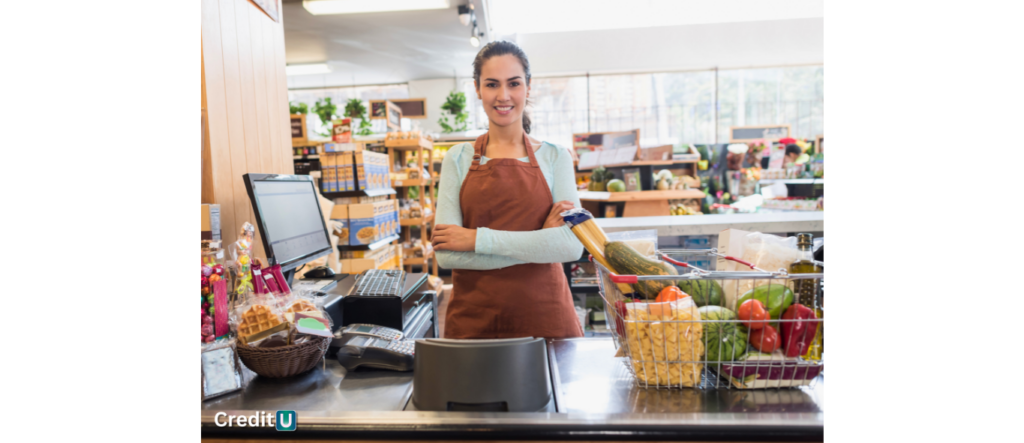Tips To Save Money At The Grocery Store
February 6, 2024

Groceries are becoming more and more expensive. Let’s talk about how much you should spend and things we can do to help you to save money at the grocery store.
Topics Covered... How Much Should You Spend On Groceries Monthly? Use Coupons Plan Your Route Buy in Bulk Check In With Local Grocery Stores Instead Of Chains Shop Local Produce Buy Off-Brand Versions Of Your Favorite Snacks and Other Non-Perishable Foods Conclusion What can CreditU do for you
Tips to Save Money at the Grocery Store – How Much Should You Spend On Groceries Monthly?
Whether it’s eggs, produce, or meat, in the last couple of years, we’ve all had a moment where we reached for a tried-and-true grocery item only to gawk at its new higher price at the grocery store. This has not only made financial planning harder but also increasingly challenging to keep up with paying off debt.
Consumers across the country have noticed the extreme inflation in food prices recently. According to the Bureau of Labor Statistics’ Consumer Price Index Summary, there was an 8.9% increase just for eggs alone. As prices continue to rise, it can be tough for the average consumer to figure out how much of their monthly income should go to groceries. And it becomes even harder to find ways to save money at the grocery store to keep in line with your budgeting and saving goals.
Some Eye Opening Statistics…
Overall, the food index went up 3.4% in 2023. Even with grocery prices high, we still need to eat. So, the question is how much should you spend on groceries every month? And how exactly can you save money at the grocery store, so that you can focus more on your debt management goals? The exact dollar amount depends on your salary, but a good rule of thumb is to not spend more than 10% of your monthly salary on groceries. This may seem tough to do if you’re living on a low income. For example, if you have an annual salary of $36,000 or lower. That’s only $3,000 a month before taxes. After taxes, you must factor in rent, utilities, credit card bills, student loan payments, and any other debts. What’s left after that may not seem like much, but with a proper budget you’ll be able to get through the month. To learn more about budgeting basics, read our article Budgeting 101. Along with a budget, you’ll need some proper tips and tricks to stretch your dollars. The first tip is to learn how to use coupons.
Use Coupons
You don’t need to have a binder or a huge bag of clipped coupons to save money using coupons. This is definitely a great way to save money at the grocery store. Of course, if you’d like to learn to how to be an extreme couponer, more power to you, but it’s not necessary. Even using one or two coupons per grocery trip can help you stay on budget. So how do you find coupons? There are a few places you can check.
- First is your mail. Some grocery stores, especially local ones, will send coupons and weekly flyers in the mail. Coupons are also likely to be sent out around holidays.
- Next, check online resources. Most stores have an app where you can look at a weekly digital flyer or add coupons to your account right from the app.
- You can also email brands. It may seem like a long shot, but if you email the company about how much you like their product, they might respond with a thank you and email or mail you coupons.
Plan Your Route
The next tip is to plan your route. Do not just stick to one grocery store out of convenience. Sometimes the other stores will have better deals on certain items. Look online to see which store has a sale on what items, then make your list, and plan your route accordingly. This tip is very effective if you’re grocery shopping for more than a week of food. To reduce the need for multiple grocery store trips, some people choose to schedule one day each month to purchase all the necessary items for the following month. If this is your plan, make sure you are aware of the expiration dates of certain fresh foods and know how to properly portion and store it in the freezer until you need it. This will also give you even more time to research upcoming sales and get coupons together before stepping out.
Buy in Bulk
Speaking of portions, buying in bulk can be a great way to save money at the grocery store. When you buy in bulk, you are typically purchasing a larger quantity of a product at a reduced price per unit. This means that the more you buy, the lower the price per unit becomes. The savings can help especially if you are struggling to pay off credit card debt. Every penny counts when it comes to effective money management.
Buying in bulk can also help you save money by reducing the number of trips you need to make to the store. By purchasing a larger quantity of a product, you can avoid having to make frequent trips to the store to restock. This can save you both time and money on transportation costs and any sneaky impulse buys while you’re back in the grocery store.
There is More to it….
Be careful though, as certain items may be a waste to buy in bulk, especially if you live alone. Unless you are planning to make enough banana bread to feed a neighborhood, you probably shouldn’t buy bunches of bananas in bulk no matter how cheap they are. Unless you’re planning to freeze them for something like smoothies, they’ll go bad too fast.
So, what are examples of things that are good to buy in bulk if the price is right? Things that you eat or use often. For example, buying meat like chicken breast in bulk can save you trips to the grocery store and money. Simply leave out what you plan to cook that week. The rest of it you need to individually package and store in the freezer. Storing them all together will leave you with a meat clump that you’ll have to completely dissolve just for one chicken breast. Have seasonings you frequently use? Stop continuously buying the small $2-$3 shakers of it and buy the large size. Those couple of bucks will continuously add up. If you were to buy a single roll of paper towels or a 4-pack of toilet tissue, it might cost you a certain amount per roll. However, if you were to buy a case of paper towels or toilet tissue, the price per roll would likely be significantly lower.
Check In With Local Grocery Stores Instead Of Chains
Shopping at local grocery stores can be a great way to support your community, get fresher and more unique products, and enjoy a more personalized shopping experience. When you buy from a local store, you’re often supporting a small business owner who is invested in the community. They may be sourcing products from local farmers and producers. This can help create a more sustainable and resilient local economy.
Local stores often have lower overhead costs than chains. This allows them to offer lower prices on certain items. They might even source their products from small, local farms and producers, which can be less expensive than purchasing from large distributors. Chains could still offer lower prices on certain products due to their economies of scale. Chains may also have more resources to leverage promotions and discounts that can lower the cost of certain products.
Whether or not shopping at local grocery stores is cheaper than chains depend on many factors, including the specific stores you’re comparing, what groceries you need to buy, and your location. You’ll have to do your research and compare prices.
Shop Local Produce
On the topic of shopping local, don’t forget about local produce! Purchasing local seasonal produce is normally cheaper than buying out-of-season and imported produce. Try visiting your local farmer’s market. These markets are a great opportunity to chat with the farmers and sellers who grow and produce the food. They may be able to offer recipes and cooking tips for the produce that’s in season. You can also check online or visit your local library for cookbooks that focus on seasonal produce.
By buying local, seasonal produce, you are not only supporting your local economy but also getting the freshest, most nutritious food available. So, next time you’re at the grocery store, consider checking out the local produce section or visiting a farmers’ market to see what’s in season.
Buy Off-Brand Versions Of Your Favorite Snacks and Other Non-Perishable Foods
Buying off-brand versions of your favorite snacks and other non-perishable foods can save you a lot of money in the long run. Off-brand products are usually cheaper because they don’t have a recognizable brand name or fancy packaging, but that doesn’t mean they’re lower in quality. In fact, many off-brand products are just as good, if not better, than their brand-name counterparts.
By opting for off-brand snacks and other non-perishable foods, you can save a significant amount of money on your grocery bill. For example, certain brands of chips are going for 6 or 7 dollars now when their off-brand counter parts are a fraction of that price. Over time, choosing the off-brand instead of the brand name can save you a lot of money.
Overall, buying off-brand versions of your favorite snacks and other non-perishable foods is a smart way to save money without sacrificing quality or taste. So next time you’re at the grocery store, consider giving some off-brand products a try!

Bottom Line – Tips to Save Money at the Grocery Store
You should try to spend no more than 10% of your monthly income on groceries. Create a monthly budget to help you stick to that. You should also consider ways to save money while shopping for groceries. Use coupons, shop around for the best deals, buy some items in bulk, visit local grocery stores, buy local in season produce, and buy off-brand items for starters.
With food price inflation continuing to rise, we must become more smart and savvy shoppers. There may be times where you need to cut certain items off your grocery list in order to maintain your budget, like a snack you can’t find an off-brand alternative for. Remember to stay on budget, do a little research, and plan your trip. Good luck out there and may the grocery pricing odds be ever in your favor…
What Can CreditU Do For You?
A personal finance app like CreditU can help you when it comes to grocery shopping.
CreditU can help you create a budget for your grocery shopping. You can set a monthly or weekly budget for your grocery shopping and CreditU will keep track of your expenses. This way, you can keep a check on your spending and ensure that you don’t overspend.
See all your accounts in one place: CreditU allows you to add your bank and credit card information to your account. No matter where you go or where you shop, always be in the financial know with CreditU. To learn more about CreditU, click here.
Key Insights
- A good rule of thumb is to not spend more than 10% of your monthly salary on groceries. Using even a couple coupons per grocery trip can help you save money and stay on budget.
- Buying some items in bulk can limit your trips to the grocery store and save you money.
- Try local grocery stores instead of chains; you might find better deals and fresher local produce. Buy local produce instead of their imported counterparts for a cheaper price.
- Buying off-brand groceries instead of name brand ones can save you money.
Last Updated on February 7, 2024 by Felicity












